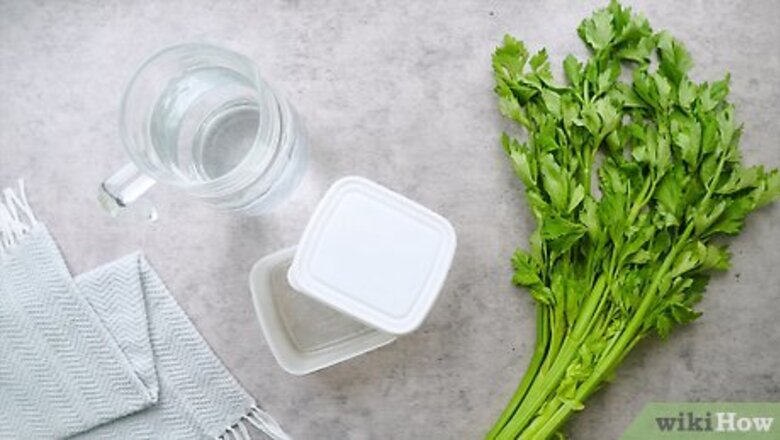
views
Storing the Celery in Water

Collect your materials. You won’t need many items in order to store celery in water. Refrigerate the celery as soon as you can, though. You should find a large glass bowl or a sealed plastic container. Either will work to store the celery. If the container doesn’t have a lid, you will need plastic wrap to seal it. It’s also possible but not as easy to use a plastic bag that you fill with water. You’ll need a supply of fresh water. The water should be clean, and it’s best to use filtered water if you have it available. Even celery that’s started to wilt can be brought back to life by immersing it in water. Choose celery that has straight and rigid stalks. The leaves should be fresh. You don’t want limp or foul smelling celery.

Dismantle the celery. In order to keep the celery fresh, you should remove the stalks from the base of the celery. Slice the base off from the stalks. Next, strip the leaves off the celery stalks. You can use do this task with a kitchen knife. Be careful anytime you use cutting instruments. Then, cut the stalks in half. You want them to be about half as long as they were on the base. Now, put the cut celery into the glass bowl or the plastic container. Leave about an inch of space between the celery and the bowl’s top.
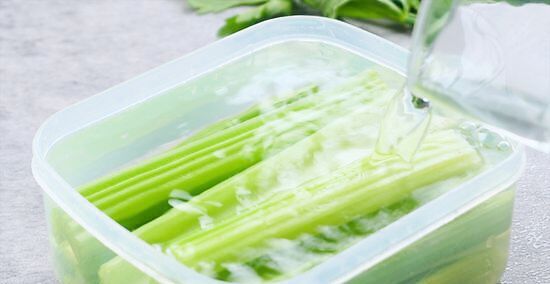
Add the water into the bowl. Pour enough fresh, clean, preferably filtered water that it fills your container. Seal the container with its lid or, if it doesn’t have one, seal the top with plastic wrap. Placing celery in an airtight container without water doesn’t work as well. The celery is likely to end up dried out. Make sure you change the water every day or at least every other day. This will keep the celery freshest. When you want some of the celery, simply remove it from the water, rinse, and eat. Replace the lid and plastic wrap if you still have celery left over.
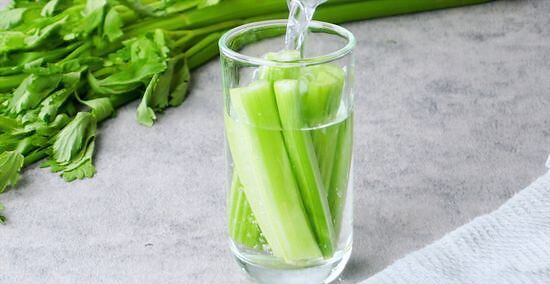
Use a glass of water. Another water method is to hack the bottom off of the celery bunch before immersing the stalks into a water glass. Celery stored in this fashion can last 1-2 weeks in a refrigerator. Stand the entire celery bunch in a glass of water inside the refrigerator. You will need a large glass for this, such as a souvenir glass (or a pitcher). When storing celery, don’t put it in the coldest areas of your refrigerator because it can freeze easily. You will need to change the water every few days at least, but this should keep the celery crisp because it will absorb the water inside the glass. The same procedure works with other root vegetables, such as beets or parsnips.
Wrapping the Celery
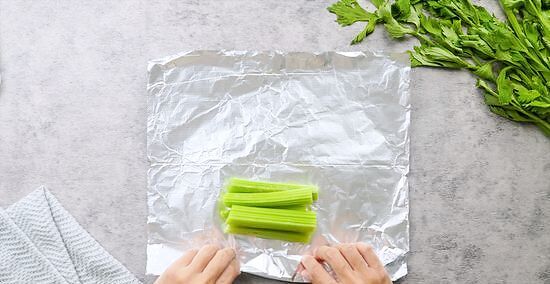
Place the celery in aluminum foil. Many people have aluminum foil in their kitchens. Storing celery in it will keep the celery crisp, even for weeks. Simply wrap the celery in the aluminum foil either cut or intact, and do so tightly. You may want to place the celery on a slightly damp paper towel before you wrap it in the foil. Place the wrapped celery in the refrigerator. The foil will enable a hormone called ethylene to get out. It’s a ripening hormone, meaning its release will keep the celery fresh. You can reuse the foil for several bunches of celery. Plastic bags don’t work as well because the ethylene gas can’t get out, making it more likely the celery will rot. Put the wrapped celery in the typical crisper drawer in your refrigerator.
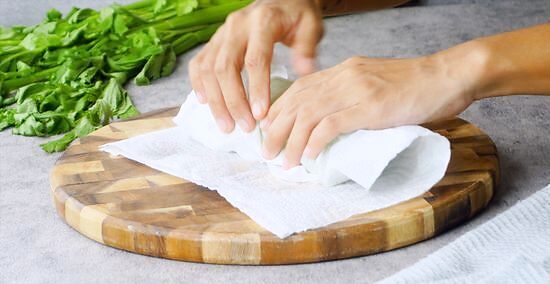
Wrap the celery in paper towels. If you don’t have aluminum foil handy, you may be able to preserve the celery’s crispness with other wraps. Cut the end of the celery bunch off so that the celery stalks are all separated. You may want to cut them in half, but it’s not necessary. Dampen paper towels. The moisture here is important. Wrap the celery in the paper towels. Place the wrapped paper towels into a large plastic zip lock bag. Seal the bag and put it into the refrigerator. Save the top, bottom and leaves of the celery and put them in a ziplock bag that you freeze. You can use them when making stock.
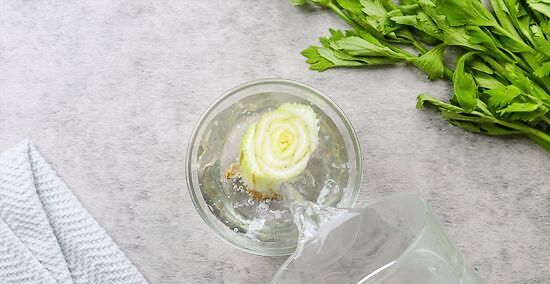
Plant the celery base. You’ve cut off the base of the celery, but you don’t have to throw it away. You can use it to grow more celery! Rinse the base off. Place it into a small bowl of warm water. Position it near a sunny window with the base side down. Every two days, change the water. It will take about a week or 10 days for tiny yellow leaves to shoot up from the base and then turn dark green. After the leaves have grown about a half inch from the center of the base, transplant it into a planter. Cover it with dirt, leaving the leaves exposed. Water it, and watch it grow!
Freezing the Celery
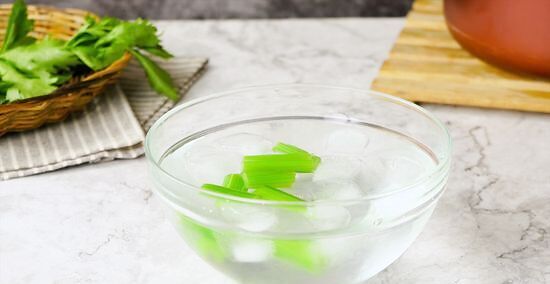
Blanch the celery. This means that you should plunge the celery into boiling water for three minutes before you freeze it. Then, chill the celery quickly by plunging It into a bowl of ice cold water. This will complete the blanching process. Drain off the extra water. You’re ready to put it into a freezer bag or an airtight container for freezing. Put the celery bag into the freezer. It’s best to use frozen celery in cooked meals after you thaw it because it will lose some of its crispness. You’ll want to blanch many cut vegetables before freezing.
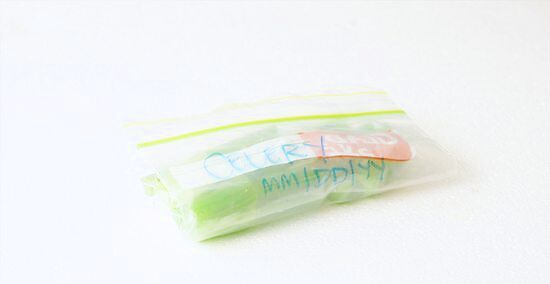
Freeze the celery to preserve it. Freezing isn’t exactly keeping celery fresh, but it will prevent it from spoiling or wilting. Wash the celery to remove any dirt attached to the vegetable, and remove it from its store package. Cut off the celery’s base. Cut the celery stalks into pieces, and remove the leaves. When freezing celery, you’ll probably want to cut the celery into pieces that are 1 to 1 ½ inches long. You could also cut the celery and spread it onto a cookie sheet. Put the sheet in the freezer. Once the celery is frozen, remove the pieces and put them into a freezer bag. Put the bag back into the freezer.

Eat the celery. Frozen celery can last more than a year to a year and a half in the freezer without going bad. Foods frozen at 0 degrees Fahrenheit will keep safe for eating for a longer time, but the 12-19 month rule is designed for best quality. Once you thaw the celery, it will soften somewhat. In contrast, celery only lasts a few weeks in the refrigerator. Celery was a revered vegetable in ancient times. It was considered rare and to have medicinal value. It was first cultivated for a Persian king. It’s about 94 percent water, but it does contain fiber and many vitamins (A, C, B-complex, and E) along with minerals. So enjoy the healthy vegetable!

















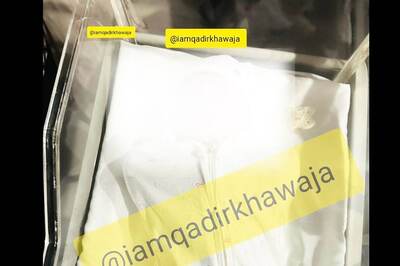

Comments
0 comment